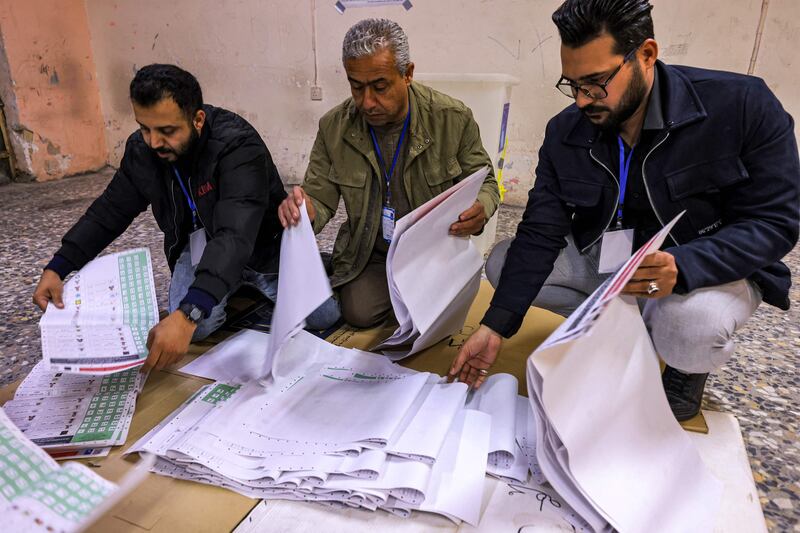Iran-backed Shiite political parties in Iraq have said they will unite to negotiate forming local governments after winning major seats in provincial council elections this week.
Monday’s provincial elections are Iraq's first in more than a decade and are seen as an important snapshot of the balance of power in the country, where various political factions – some aligned with neighbouring Iran – are vying for influence.
But the election drew a turnout of only 41 per cent, as supporters of Iraq’s influential Shiite cleric Moqtada Al Sadr and other pro-reform Iraqis boycotted the vote.
This paved the way for three electoral alliances led by powerful Shiite militia groups, former prime minister Nouri Al Maliki and cleric Ammar Al Hakim to sweep the elections in nine Shiite-dominated provinces. They also performed strongly in the capital Baghdad, which has a Shiite majority.
The three groups are the main pillars of the Co-ordination Framework, the biggest bloc in parliament, which formed the government of current Prime Minister Mohammed Shia Al Sudani.
After contesting the elections individually, these parties agreed to form a unified coalition called the Co-ordination Framework Bloc in each province to “expedite forming the local councils”, it said after a meeting late on Wednesday.
Nabni Alliance, or We Build, which brought together powerful Iran-backed Shiite militias, came first in the provinces of Babil, Dhi Qar, Qadissiyah, Najaf and Maysan. It came second in Baghdad and Basra.
Mr Al Maliki’s State of Law alliance came first in the province of Al Muthana and second in Maysan, Qadissiyah, Karbala, Babil, Wassit, Dhi Qar and Najaf. It was third in Baghdad and Basra.
The third group, Mr Al Hakim’s State Forces Alliance, also performed well in the Shiite-dominated provinces compared with its performance in the 2021 national elections.
Together, they won 101 seats of the 285 available in provincial council elections, Iraq News Agency reported, based on the preliminary results for 94.4 per cent of the ballots announced by the Independent High Electoral Commission on Tuesday.
Nabni took the most seats of the three groups, with 43, followed by State of Law Alliance with 35 seats and State Forces Alliance with 23 seats, according to INA.
The move will strengthen their position in negotiations with other factions, including in Basra, where a list backed by popular independent governor Asaad Al Eidani won most seats, and Baghdad, where ousted Sunni parliament speaker Mohammed Halbousi came first.
Mr Al Halbousi’s Taqadum Alliance has won 22 seats, according to INA. He is likely to join forces with Sunni tycoon Khamis Al Khanjar’s Siyyada Party, which took 14 seats, which would be largest Sunni bloc.
Both Sunni leaders co-operated with the Co-ordination Framework in parliament to form the government in October last year.
"The number of our seats will definitely increase when other smaller lists and individual candidates linked to CF inside will join us," a legislator with the Co-ordination Framework told The National on Thursday.
"We will have a strong a position in the upcoming negotiations when final results are announced mainly in Baghdad and Basra. It's hard to lose strong presence in these provinces," he added, without giving more details.
Mr Al Sadr's move to boycott the elections came after he ordered his supporters to resign and withdraw from the political process last year, following a year-long political deadlock around forming a government, which allowed his rivals to strengthen their presence in parliament.
The election boycott “diminishes its legitimacy domestically and internationally, and reduces the influence of corrupt individuals in our beloved Iraq”, Mr Al Sadr told his supporters last month.
Although Mr Al Sadr took part in and has supported all governments since the 2003 US-led invasion that toppled Saddam Hussein, he has repositioned himself as a reformist who is critical of the status quo. Mr Al Sadr has called out Iran's growing influence in Iraq, pitting himself against the Iran-backed Co-ordination Framework.
Mr Al Sadr tried to ride the wave of youth-led, pro-reform protests that swept Iraq in October 2019, but failed to secure a leadership role among the grassroots protesters who denounced corruption, unemployment and the political elite.
This week's elections took place against the backdrop of widespread dissatisfaction with the same issues.
The highest turnout, 66 per cent, was registered in the ethnically mixed and contested province of Kirkuk, which is claimed by Kurds, Arabs and Turkmen.
The Kurds' Kirkuk Is Our Strength Alliance, led by the Patriotic Union of Kurdistan party, or the PUK, came first, followed by Arab and Turkmen alliances.
The PUK is one of the tow main Kurdish parties. Its rival, the Kurdistan Democratic Party, came first in northern Nineveh province.
After Kirkuk, the next highest turnout was in the Sunni-dominated provinces of Salaheddin, north of Baghdad, and Anbar, to the west, with 59 per cent and 57 per cent, respectively.
The lowest turnout was in the Shiite-dominated provinces in southern and central Iraq as well as Baghdad, mainly due to the boycott by Mr Al Sadr and the pro-reform activists.
The vote took place in only 15 of the 18 provinces. Three provinces, which form the Kurdish region in northern Iraq, operate under a separate, autonomous system.







